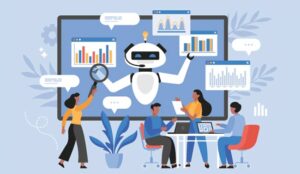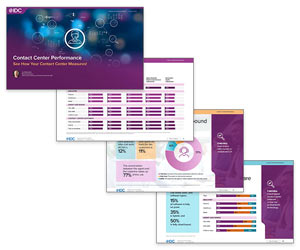Talkdesk’s Jay Gupta looks at the benefits of artificial intelligence for businesses and the world.
As the world changes, it’s important to think about artificial intelligence–how it’s reshaping industries, how it can be used, and what can be accomplished with its speed and efficiency.
The solutions that people create using AI reveal a great deal about problem-solving, innovation, and how to modernize for the future of business.
At the same time, adopting and adapting to AI can be intimidating, especially because it has so many possible use cases. Exploring the myths, drawbacks, and benefits of artificial intelligence for businesses leads to a deeper understanding of its capabilities and the possibilities in front of us.
Recently, Paige Lord, AI ethicist and TikTok influencer, shared a number of use cases that demonstrate how AI supports innovation across industries and how it makes the world a better place.
As an AI ethicist, Paige takes a measured approach to understanding the potential benefits and potential harms of AI.
Artificial intelligence is behind countless groundbreaking inventions and industrial advancements. These solutions make a difference for people, businesses, and the planet every single day. Learn more and get inspired by the benefits of AI in business.
Benefits of Artificial Intelligence in Healthcare.
Visiting the doctor, going in for surgery, and getting treatment for an injury or an illness is always a vulnerable experience. It’s understandable that patients and their families want transparency around how AI is being used and reassurance that their medical care isn’t being taken lightly.
There are a number of ways the benefits of artificial intelligence are leveraged throughout the medical field to improve patient care, including pharmaceutical manufacturing, going to the doctor, and having surgery.
Learn about how artificial intelligence is used across the medical industry to create a more cohesive understanding of patient care.
AI in the Pharmaceutical Industry.
Millions of people rely on pharmaceutical companies to create medications en masse and distribute them in a timely manner. In the pharmaceutical sector, companies are subject to highly strict regulations that are incredibly complex and intricate.
To develop and distribute medications, pharmaceutical companies have complex industrial processes that span development, quality control, testing, packaging, and shipping.
These expansive processes yield a great deal of data, and yet there’s a paucity of data use. Critical data can go unused because it’s incredibly challenging and time-consuming for human beings to delve into it and analyze it.
Pharmaceutical companies have come to rely on AI because it can parse through structured and unstructured data about medications and pharmaceutical manufacturing processes with remarkable speed and accuracy.
AI can detect anomalies and productivity issues within manufacturing processes and help streamline the many steps of the processes to reduce overall expenses for companies and drive down costs for consumers.
AI at the Doctor.
AI is used in doctor’s offices around the world to help monitor patient care. In the past, patients were often seen one-on-one and the information about a patient’s care would have been recorded on a paper chart and stored away once they were discharged.
It would have been difficult or nearly impossible to know if patient care was conducted outside standard practices and procedures.
Now, with AI and machine learning, medical care providers can leverage technology to analyze massive amounts of patient charts to detect similarities and anomalies in care, disease or treatment trends, and free up medical professionals to work more closely with patients throughout recovery.
AI in Surgery.
A particularly fascinating benefit of artificial intelligence is the use case for the da Vinci surgical robot. The da Vinci robot falls under the umbrella of artificial intelligence because it mimics human behavior by assisting in performing surgery. To date, the da Vinci system has assisted in more than 10 million surgical procedures.
The da Vinci robot is under the control of a doctor throughout the entire procedure and it doesn’t make any independent decisions.
But with the help of da Vinci systems, surgeons can perform more surgeries with greater precision, which leads to less invasive surgeries and faster recovery times for patients.
How AI Is Helping in Other Industries.
AI in Banking and Finance.
AI is already broadly used across the banking and finance industry. One of the most critical use cases for AI is security and fraud detection.
Decades ago, if a bank account was subject to fraudulent activity, the account holder would not know until it was too late. Now, banks are using artificial intelligence to scan billions of transactions on accounts to look for anomalies, which helps them identify fraud faster.
If AI detects unusual activity on an account, it will trigger a series of actions that notify the bank and protect account holders.
The card will be locked, transactions will be declined, and the account holder will receive notifications from the bank that there is suspicious activity on the account. Around the world, AI helps safeguard millions of banking and finance accounts with proactive measures that curtail fraud.
AI in Agriculture.
In the agriculture sector, growers use artificial intelligence including sensors, monitors, and machine learning models to monitor crop production and other factors like Sun index, precipitation, signs of disease, and cold fronts.
Monitoring systems that leverage AI make it so that growers don’t have to manually check crops every day, which saves significant time and labor.
The AI systems detect problems faster, reduce harm to crops, and prevent profit loss and supply chain disruption. Artificial intelligence helps growers take precise action with pest control, disease, and other factors that could negatively impact crops, the business, and the supply chain.
Benefits of Artificial Intelligence in Customer Service.
In the past, chatbots and voicebots weren’t as sophisticated as they are today. Some people still believe that all chatbots are bad because poorly designed chatbots and voicebots of the past left a negative impression.
Chatbots and voicebots have evolved into incredibly valuable tools that save customers time and effort. AI is capable of parsing through high volumes of voice and chatbot conversations to help companies better understand customer concerns and conduct sentiment analysis.
The nature of the voice or chatbot is that it learns through data. The more data a company has available to train a bot, the better prepared it will be to handle customer concerns with speed, efficiency, and delicacy.
There are a number of use cases for chatbots and voicebots, including customer-facing and support-facing applications.
AI as Customer-Facing Voice and Chatbots.
Customers interact with chatbots on websites or in applications. AI chatbots mimic human behavior and leverage several branches of AI including machine learning, natural language processing, and occasionally translation and image recognition.
At times, people struggle to use chatbots. This is likely because the company didn’t create a chatbot that successfully directs the customer to the information they need.
When this happens, the customer is left feeling frustrated with the company, the product, and the service because they’re not able to get their issue resolved.
When companies invest in chatbots that use machine learning to gain knowledge from customer interactions, there is a real opportunity to consistently generate successful outcomes.
Chatbots can help customers navigate complex websites to find simple information, like a support phone number. These tools give customers the support they need to solve simple problems on their own.
Voicebots have also been considered controversial in the past, but just like chatbots, the technology has evolved into one of the best ways to direct customers to the in-person support they need.
As a result, support staff can focus on solving customer problems quickly instead of attempting to triage. Support staff can be trained for specific and complex issues, which saves customers time and makes companies more efficient.
While they differ, the rules for designing chatbots and voicebots are the same. If a company doesn’t invest in a quality voice or chatbot product, customers will end up frustrated, which leads to a lack of loyalty to the brand and a loss of profit.
Companies must take chatbot and voicebot investments seriously to meet the growing expectations of today’s customers.
AI as Support-Facing Voice and Chatbots.
Support-facing chatbots are one of the greatest benefits of artificial intelligence helpful to businesses around the globe.
People who work in support and contact centres navigate a vast range of customer issues all day long and there isn’t always a clear path to resolution for every problem. AI makes it possible for support staff to find potential solutions faster, with less troubleshooting.
When support staff and agents have the ability to look up information quickly and efficiently, numerous outcomes improve.
Chatbots can help increase access to data and information across a company. Innersourcing is critical for all companies and business operations, but it’s especially useful in call centres and support centres where team members interact with customers on a daily basis.
At some point, everyone has engaged with a bot that says, “This call may be recorded for quality and training purposes.”
It’s true that these calls are used for support staff training, but they can also be used to train AI models. Everyday customer conversations can be used to train voice models for specific accents, speaking cadences, and clusters of words that easily direct customers to specific or specialized support.
Sentiment analysis helps companies evaluate what a customer’s need was, their temperament, and whether they were frustrated and to what extent.
As a result, sentiment analysis can be used to understand what may be causing customer frustration with products, services, or support so that issues can be resolved quickly.
Final Thoughts About the Benefits of Artificial Intelligence.
There are numerous uses cases and benefits of artificial intelligence in the business world and we are only scratching the surface with these examples. AI will certainly continue to help reshape and modernize businesses around the world.
Contact centre and customer service operations are well positioned to take advantage of the amazing capabilities AI has to offer, including sophisticated chatbots and voicebots that generate new and efficient solutions for businesses in every industry and their customers.
This blog post has been re-published by kind permission of Talkdesk – View the Original Article
For more information about Talkdesk - visit the Talkdesk Website
Call Centre Helper is not responsible for the content of these guest blog posts. The opinions expressed in this article are those of the author, and do not necessarily reflect those of Call Centre Helper.
Author: Talkdesk
Published On: 2nd May 2023 - Last modified: 23rd Apr 2024
Read more about - Guest Blogs, Jay Gupta, Talkdesk






 Talkdesk is a global customer experience leader for customer-obsessed companies. Our contact center solution provides a better way for businesses and customers to engage with one another.
Talkdesk is a global customer experience leader for customer-obsessed companies. Our contact center solution provides a better way for businesses and customers to engage with one another. 












